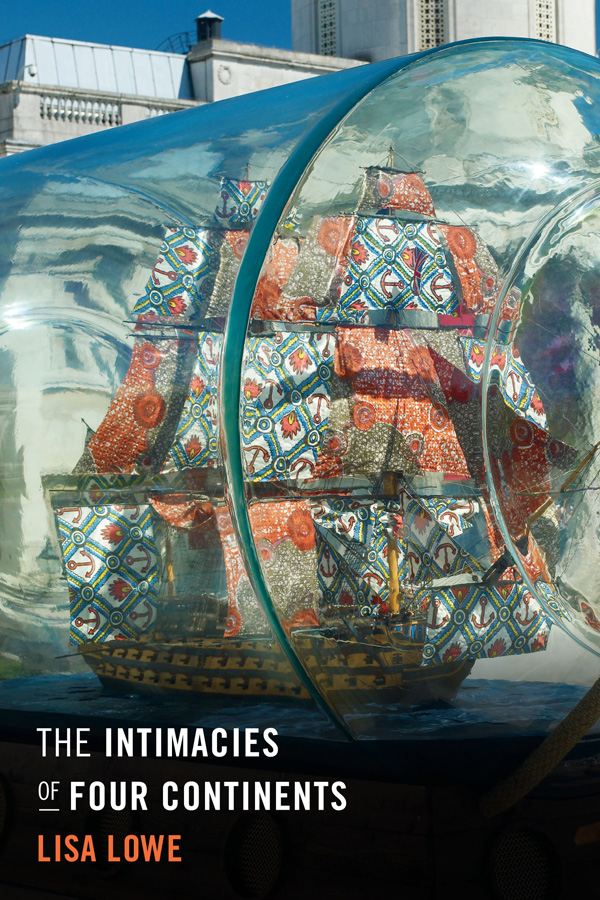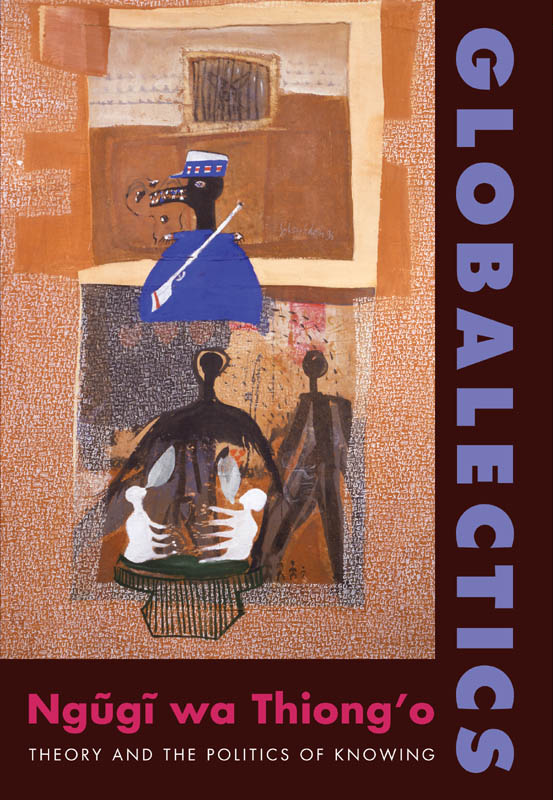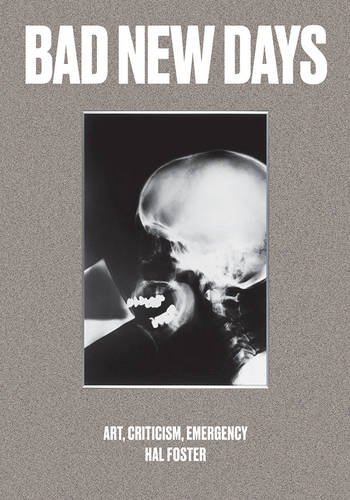Lisa Lowe: The Intimacies of Four Continents (2015)
Filed under book | Tags: · 1700s, 1800s, abolitionism, asia, black people, capitalism, colonialism, dialectic, governance, history, imperialism, indigenous peoples, intimacy, knowledge, labour, liberalism, marxism, narrative, race, slavery, trade, united states, violence

“In this uniquely interdisciplinary work, Lisa Lowe examines the relationships between Europe, Africa, Asia, and the Americas in the late eighteenth- and early nineteenth- centuries, exploring the links between colonialism, slavery, imperial trades and Western liberalism. Reading across archives, canons, and continents, Lowe connects the liberal narrative of freedom overcoming slavery to the expansion of Anglo-American empire, observing that abstract promises of freedom often obscure their embeddedness within colonial conditions. Race and social difference, Lowe contends, are enduring remainders of colonial processes through which “the human” is universalized and “freed” by liberal forms, while the peoples who create the conditions of possibility for that freedom are assimilated or forgotten. Analyzing the archive of liberalism alongside the colonial state archives from which it has been separated, Lowe offers new methods for interpreting the past, examining events well documented in archives, and those matters absent, whether actively suppressed or merely deemed insignificant. Lowe invents a mode of reading intimately, which defies accepted national boundaries and disrupts given chronologies, complicating our conceptions of history, politics, economics, and culture, and ultimately, knowledge itself.”
Publisher Duke University Press, Durham, NC, June 2015
ISBN 9780822358633, 0822358638
319 pages
Discussion: Gayatri Gopinath, Alyosha Goldstein, Moon-Ho Jung, Stephanie Smallwood (book roundtable at ASA Conference, Toronto, 2015, video).
Reviews: John Holmwood (Theory, Culture & Society, 2016), Betty Joseph (American Historical Review, 2016), Hossein Ayazi (Qui Parle, 2016), Michael Gaffney (Journal of American Studies, 2016), Adam Nemmers (Women’s Studies, 2016), Marion C. Rohrleitner (Pacific Historical Review, 2016), Lance Bertelsen (Modern Philology, 2017), Harrod J Suarez (Melus: Multi-Ethnic Literature of the U.S., 2017), Jesse van Amelsvoort (Nexus Instituut, n.d.), Hadley Howes (Antipode, 2020).
Ngũgĩ wa Thiong’o: Globalectics: Theory and the Politics of Knowing (2012)
Filed under book | Tags: · africa, dialectic, globalisation, knowledge, literary criticism, literary theory, literature, neocolonialism, orality, politics, postcolonialism, theory

“A masterful writer working in many genres, Ngũgĩ wa Thiong’o entered the East African literary scene in 1962 with the performance of his first major play, The Black Hermit, at the National Theatre in Uganda. In 1977 he was imprisoned after his most controversial work, Ngaahika Ndeenda (I Will Marry When I Want), produced in Nairobi, sharply criticized the injustices of Kenyan society and unequivocally championed the causes of ordinary citizens. Following his release, Ngũgĩ decided to write only in his native Gikuyu, communicating with Kenyans in one of the many languages of their daily lives, and today he is known as one of the most outspoken intellectuals working in postcolonial theory and the global postcolonial movement.
In this volume, Ngũgĩ wa Thiong’o summarizes and develops a cross-section of the issues he has grappled with in his work, which deploys a strategy of imagery, language, folklore, and character to ‘decolonize the mind.’ Ngũgĩ confronts the politics of language in African writing; the problem of linguistic imperialism and literature’s ability to resist it; the difficult balance between orality, or ‘orature’, and writing, or ‘literature’; the tension between national and world literature; and the role of the literary curriculum in both reaffirming and undermining the dominance of the Western canon. Throughout, he engages a range of philosophers and theorists writing on power and postcolonial creativity, including Hegel, Marx, Lévi-Strauss, and Aimé Césaire. Yet his explorations remain grounded in his own experiences with literature (and orature) and reworks the difficult dialectics of theory into richly evocative prose.”
Publisher Columbia University Press, New York, 2012
Wellek Library Lectures in Critical Theory series
ISBN 9780231159500, 0231159501
xi+104 pages
Reviews: Publishers Weekly (2011), Corbin Treacy (Transnational Lit, 2012), Danson Kahyana (Slip, 2012), Geoff Wisner (Words Without Borders, 2012), M.A. Orthofer (Complete Rev, 2012), Jenna N. Hanchey (E3W Rev of Books, 2013), Devin Zane Shaw (Society+Space, 2013), Magalí Armillas-Tiseyra (E-Misférica, 2014), Oliver Lovesey (Cambridge J Postcolonial Lit Inquiry, 2014), Ndiritu Wahome (2016).
Comment (0)Hal Foster: Bad New Days: Art, Criticism, Emergency (2015)
Filed under book | Tags: · abject, aesthetics, archive, art, art criticism, art history, critique, dialectic, fetish, mimesis, neoliberalism, poststructuralism, precarity, theory

“Bad New Days examines the evolution of art and criticism in Western Europe and North America over the last twenty-five years, exploring their dynamic relation to the general condition of emergency instilled by neoliberalism and the war on terror.
Considering the work of artists such as Thomas Hirschhorn, Tacita Dean, and Isa Genzken, and the writing of thinkers like Jacques Rancière, Bruno Latour, and Giorgio Agamben, Hal Foster shows the ways in which art has anticipated this condition, at times resisting the collapse of the social contract or gesturing toward its repair; at other times burlesquing it.
Against the claim that art making has become so heterogeneous as to defy historical analysis, Foster argues that the critic must still articulate a clear account of the contemporary in all its complexity. To that end, he offers several paradigms for the art of recent years, which he terms “abject,” “archival,” “mimetic,” and “precarious.””
Publisher Verso, London and New York, 2015
ISBN 1784781460, 9781784781460
208 pages
Presentation and discussion (video, The Kitchen, NYC, Sep 2015)
Interview (John Douglas Millar, Mute, Nov 2015)
Reviews: Mark Steven (Affirmations 2015), Brian Dillon (Guardian 2015), Rachel Wetzler (ArtNews 2015).
Comment (1)
